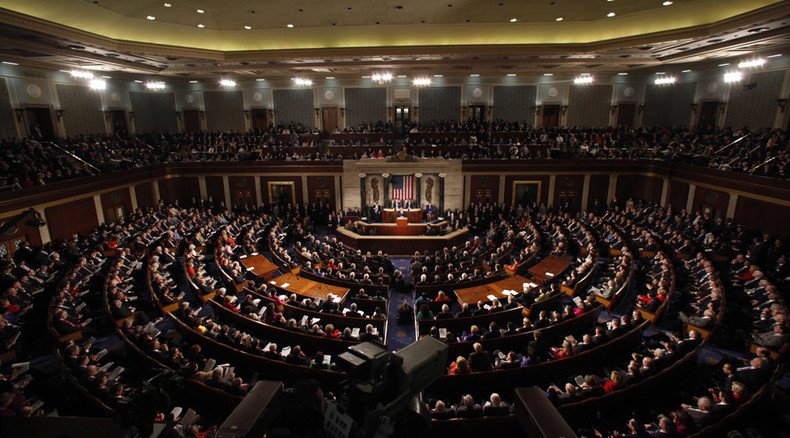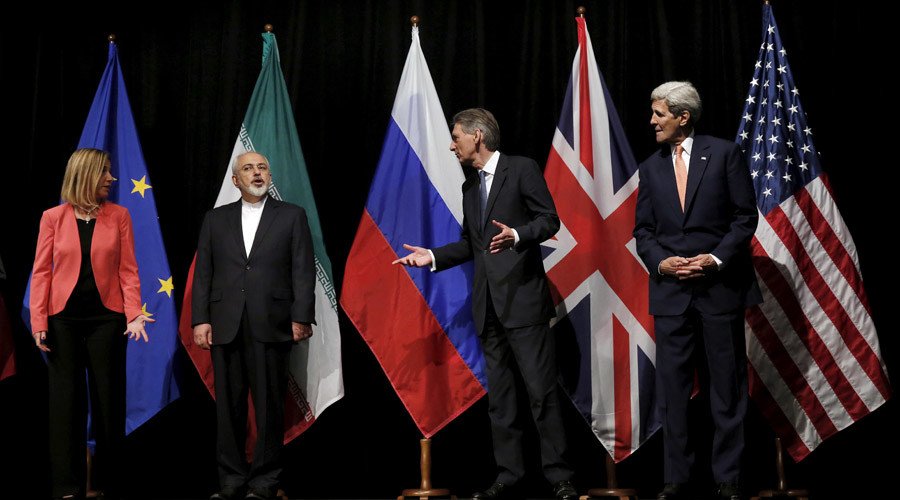‘Iran deal will survive even if Congress votes against’

After years of talks, a nuclear deal with Iran has finally been reached. However, many in Congress, and US ally Israel, immediately called for it to be quashed. So what are its chances of approval and success? RT spoke to two experts to find out.
President Obama hailed the “comprehensive, long-term deal” as a major achievement, calling it “a historic chance to pursue a safer and more secure world” and stressing it will “prevent Iran from obtaining a nuclear weapon.”
However, before the ink on the draft agreement was even dry, many members of Congress, primarily Republicans, and close ally Israel responded with doubt and outrage. Hawkish Senator Lindsey Graham (R-South Carolina), a staunch supporter of Israel, went so far as calling it “akin to declaring war on Israel and the Sunni Arabs.”
READ MORE: Pentagon chief to Israel: Iran deal is good, military option still on the table
Two Republican presidential candidates chimed in, with former Florida Governor Jeb Bush calling the accord a “dangerous, deeply-flawed, and short-sighted deal,” while Wisconsin Governor Scott Walker branding it “one of America’s worst diplomatic failures.”
Meanwhile, not all Democrats were pleased either, as Senator Joe Lieberman (D-Connecticut) called the deal “the greatest disappointment.”
With the treaty needing Capitol Hill’s approval before coming into force, RT talked about prospects for its passage with State Representative from Massachusetts Paul Heroux, a Middle East analyst and US congressional candidate, and arms control expert Tariq Rauf, former head of the Verification and Security Policy Coordination Office at the International Atomic Energy Agency (IAEA).
Congressional approval
Heroux was pessimistic about the deal’s chances of winning outright approval in Congress, saying, “these US Representatives and Senators, they are likely to vote down this deal,” noting “a lot of the critics of the deal were critical of negotiations in the first place.”
Rauf didn’t see this as a deal-killer, however, as Obama has promised to veto any congressional rejection of the agreement, which would require a two-thirds majority to overturn.
“I believe the deal will survive, even if Congress votes against it, President Obama has said that he would veto [the rejection]. Congress would then need to get a two-thirds majority in the US Senate, which is very unlikely, so I would say that President Obama and Secretary [of State John] Kerry can be confident that this deal would be implemented.”

But will it work?
Heroux is confident that the deal will be effective in its goal of preventing Iran from developing a nuclear weapon.
“This deal actually stops the four different ways that Iran could have pursued a nuclear weapon, which I’ve said many times before. There is no evidence of a nuclear weapon program, but this plan basically blocks all four different ways.”
A former nuclear watchdog official, Rauf also expressed optimism, stating “I would characterize this deal as stunning historic success,” stressing that the new agreement has effective mechanisms to ensure that Iran is compliant with the treaty’s terms.
READ MORE: Deal on Iranian nuclear programme: Diplomacy at work
“Iran is obligated to provide to the IAEA access even to sensitive and military sites, provided the IAEA makes a good case for visiting such sites,” he said, adding “there are provisions for access and a mechanism to ensure that, even if there is a dispute between Iran and he IAEA for getting access, the IAEA can be provided access.”
Rauf also stressed the deal provides Iran with clear incentives for following the agreement, as “they also get a lot of sanctions relief,” and “after some number of years, would be able to resume commercial enrichment for peaceful purposes under IAEA verification.”
How to sell it to Israel
Heroux admitted that Israel was unlikely to ever approve of the idea, as Prime Minister Benjamin Netanyahu has been “opposed to any negotiation right from the start” and would only be satisfied if Iran had “no nuclear program, even within the rights of the nonproliferation treaty,” which he does not see as realistic.
In the long term, however, he doesn’t think the fallout from the deal is “going to be too damaging,” pointing out that “the US and Israel have a long history of economic, diplomatic, political, military cooperation.” He also noted that it is “the largest recipient of US foreign aid.”
The congressional candidate is hopeful that Israel will eventually come around to seeing the agreement as positive: “I also think that once this deal starts to prove to be an effective deal at monitoring Iran’s nuclear program, I think then some of the concerns will probably ease.”
Rauf pointed out that a new military package that the US is said to be offering Israel as compensation for the deal, may also help smooth things out.
“Well, today, I gather, Defense Secretary Ashton Carter is on his way to Israel, and he, I think, will offer them a defense package, which I think the current Israeli prime minister has spurned, but IDF, the Israeli Defense Forces, have said that they would like this additional military assistance from the US,” he said.
Future relations
The deal’s ability to draw the two countries closer and lead to other areas of cooperation have recently been cast into doubt by statements from Iran’s supreme leader, Ayatollah Ali Khamenei.
“Even after this deal our policy towards the arrogant US will not change,” he said as cited by Reuters, adding “US policies in the region are diametrically opposed with Iran’s policies.”
READ MORE: Iran’s opposition to ‘arrogant’ US won’t change despite nuclear deal – Khamenei
Rauf brushed off these concerns, calling them talk to appease domestic critics: “Just as on the Western side you find that all the advantages of restrictions on Iran’s nuclear program are advertised, I think here the supreme leader is trying to convey to his hardliners and conservatives that Iran hasn’t given away the shop.”
Asked whether the new accord could pave the way for a rapprochement between the US and Iran, Heroux pointed out that, “this deal wasn’t meant to normalize relations between two nations, much like the US and Cuba have recently done.”
However, he did express optimism that that “maybe eventually,” the deal could lead to a deeper reconciliation.
“You know, plan itself gives hope. It shows that Iran can be cooperative and that negotiations can happen and there are other areas of interest that the US and Iran share, two of such are ISIS (Islamic State), as well as the drug trade coming out of Afghanistan.”
The statements, views and opinions expressed in this column are solely those of the author and do not necessarily represent those of RT.
The statements, views and opinions expressed in this column are solely those of the author and do not necessarily represent those of RT.












